Books on consciousness
A list of books relating to the hard problem of consciousness. Regularly updated cos I keep finding new stuff all the time.
A list of books relating to the hard problem of consciousness. Regularly updated cos I keep finding new stuff all the time.
2008
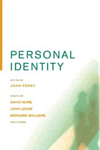 John Perry (ed.)
John Perry (ed.)
Personal Identity
(Univ. California Press 2008, 2nd edition)
An updated version of this classic collection of essays on personal identity. The essays range from Locke’s classic memory account to recent defenses and criticisms of it. New to this edition are Shoemaker’s seminal essay ‘Persons and Their Pasts,’ selections from the Clark-Collins correspondence, and a new paper by Perry. Original edition 1975. See UC Press | Amazon | Google
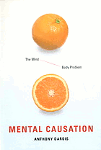 Anthony Dardis
Anthony Dardis
Mental Causation: The Mind-Body Problem
(Columbia Univ. Press 2008)
Lucretius said that everything is atoms in the void. Contemporary physicalism agrees. How then can we—how can our thoughts, emotions, values—make anything happen in the physical world? This conceptual knot, the mental causation problem, is the core of the mind-body problem. In this book, Dardis shows us how to unravel the knot. See Columbia | Amazon | Google
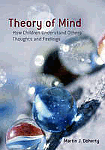 Martin J. Doherty
Martin J. Doherty
Theory of Mind: How Children Understand Others’ Thoughts and Feelings
(Psychology Press 2008)
Most of us are continually aware that others have thoughts and feelings – but are children? When? This book is a concise and readable review of the extensive research into children’s understanding of what other people think and feel, a central topic in developmental psychology known as “Theory of Mind.” See Psychology Press | Amazon | Google
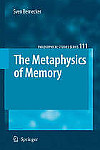 Sven Bernecker
Sven Bernecker
The Metaphysics of Memory
(Springer 2008)
Bernecker investigates central issues in the philosophy of memory and defends a version of the causal theory of memory. He also argues for direct realism about memory, proposes an externalist response to skepticism about memory knowledge, and develops a contextualist account of the factivity constraint on memory. See Springer | Amazon | Google
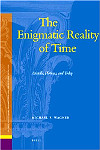 Michael F. Wagner
Michael F. Wagner
The Enigmatic Reality of Time: Aristotle, Plotinus, and Today
(Brill 2008)
This book integrates approaches from physics, philosophy, psychology, biology, phenomenology, and technology studies to explain a number of facets of the perennial question of time’s nature and existence. It also explores and explains two of the most influential investigations of time in classical Western thought: those of Aristotle and Plotinus. See Brill | Amazon | Google
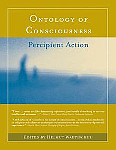 Helmut Wautischer (ed.)
Helmut Wautischer (ed.)
Ontology of Consciousness: Percipient Action
(MIT 2008)
In this volume, scholars from various disciplines go beyond current neuroscience to explore insights offered by other approaches to consciousness. They consider such philosophical approaches to consciousness as Tibetan Tantric Buddhism, North American Indian insights, pre-Columbian Mesoamerican civilization, and the Byzantine Empire. See MIT | Amazon | Google
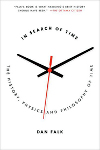 Dan Falk
Dan Falk
In Search of Time
(Macmillan 2008)
Time is the very foundation of conscious experience. Yet as familiar as it is, time is also deeply mysterious. Falk chronicles the story of how human beings have come to understand time over the millennia and, by drawing from the latest research in physics, psychology, and other fields, shows how that understanding continues to evolve. See Macmillan | Amazon | Google
 L. Nathan Oaklander (ed.)
L. Nathan Oaklander (ed.)
The Philosophy of Time
(Routledge 2008)
This four-volume set is an authoritative reference that makes sense of the subject’s vast literature and continuing explosion in research output. Edited by L. Nathan Oaklander, a leading scholar in the philosophy of time, this work provides a synoptic view of the canonical scholarship and current debates at the cutting edge of the subject. See Routledge | Amazon | Google | See this flyer
 Barry Dainton
Barry Dainton
The Phenomenal Self
(Oxford 2008)
Dainton presents a new account of the self, the key to which is phenomenal continuity. Provided our mental life continues, we can easily imagine surviving dramatic physical alterations. Dainton argues that such mental continuity is satisfactorily framed in terms of the sort of continuity we find in our streams of consciousness from moment to moment. See Oxford | Amazon | Google
 John Foster
John Foster
A World for Us: The Case for Phenomenalistic Idealism
(Oxford 2008)
Foster argues that the world is ultimately constituted by facts about human sensory experience, or some richer complex of non-physical facts in which such experience centrally features. This sensory organization creates the physical world by disposing things to appear systematically world-wise at the human empirical viewpoint. See Oxford | Google | B. J. Garrett review
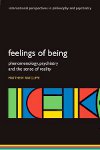 Matthew Ratcliffe
Matthew Ratcliffe
Feelings of Being: Phenomenology, Psychiatry and the Sense of Reality
(Oxford 2008)
A philosophical account of existential feelings in psychiatric illness and everyday life. Ratcliffe proposes that existential feelings have three distinctive characteristics: they are bodily feelings, constitute ways of relating to the world, and are responsible for our sense of reality. He also explains how a bodily feeling can be a sense of reality and belonging. See Oxford | Amazon | Google
 Raymond Tallis
Raymond Tallis
The Kingdom of Infinite Space: A Portrait of Your Head
(Yale 2008)
Blending science, philosophy, and humor, Tallis examines the head, what happens in it, and how it is and is not connected to our sense of identity and consciousness. He aims, as he says, to turn readers into astonished tourists of the piece of the world closest to them, so they never again take for granted the head that looks at them from the mirror. See Yale | Amazon | Google
 Edmond Leo Wright (ed.)
Edmond Leo Wright (ed.)
The Case for Qualia
(MIT 2008)
Many philosophers dismiss the notion of qualia, or sensory experiences that are internal to the brain. Qualiaphiles face the difficulty of establishing contact with the world when their access to it is seen by qualiaphobes to lie behind a “veil of sensation.” In this collection, proponents of qualia defend the indirect realist position and vigorously attack their opponents. See MIT | Google
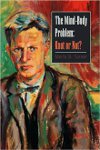 Merle B. Turner
Merle B. Turner
The Mind-Body Problem: Knot or Not?
(Xlibris 2008)
Written over a period of fifteen years, this is the latest word on the identity theory: that mind and body are one. The reality of mind and body, their interaction, and the relation of knowledge of the mind to the brain are thoroughly explained. Turner provides a lucid examination of consciousness and shows how the divide between mind and brain can be bridged. See Xlibris | Google
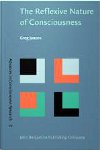 Greg Janzen
Greg Janzen
The Reflexive Nature of Consciousness
(John Benjamins 2008)
Janzen argues that conscious states are necessarily reflexive: they have a built-in, “implicit” awareness of their own occurrence. He also explores the relation between reflexivity and phenomenal experience, offering the innovative thesis that phenomenal character is constituted by the implicit self-awareness built into every conscious state. See John Benjamins | Google
 Andy Clark
Andy Clark
Supersizing the Mind
(Oxford 2008)
Clark argues that thinking doesn’t happen only in our heads but that “certain forms of human cognizing include inextricable tangles of feedback, feed-forward and feed-around loops: loops that promiscuously criss-cross the boundaries of brain, body and world.” A sustained argument in favor of a conception of mind that is extended rather than “brain-bound.” See Oxford | Google
 Simon Ings
Simon Ings
A Natural History of Seeing
(W. W. Norton 2008)
We spend about one-tenth of our waking hours completely blind. Only one percent of what we see is in focus at any one time. There is no direct fossil evidence for the evolution of the eye. In graceful prose, Ings explores such mysteries, reaching back to ancient beliefs that vision arises from mysterious optic rays and forward to the day when robots can see. See W. W. Norton | Google | Amazon
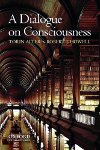 Torin Alter & Robert J. Howell
Torin Alter & Robert J. Howell
A Dialogue on Consciousness
(Oxford 2008)
As an entirely physical phenomenon, consciousness seems to elude scientific explanation. But if consciousness is not physical, then how can it be explained? This book features two main characters, Tollens and Ponens—unemployed graduate students who secretly live in a university library—who bring the debate alive. See Oxford | Google | Amazon
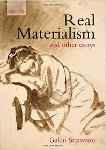 Galen Strawson
Galen Strawson
Real Materialism and Other Essays
(Oxford 2008)
Written over two decades, these essays in the philosophy of mind and metaphysics cover five main areas: the mind-body problem; the self; free will and moral responsibility; thought, intentionality and their relation to consciousness; and the problem of causation with particular reference to the philosophy of David Hume. See Oxford | Google | Amazon | Andrew Melnyk review
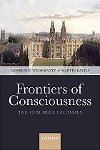 L. Weiskrantz & Martin Davies (eds.)
L. Weiskrantz & Martin Davies (eds.)
Frontiers of Consciousness
(Oxford 2008)
This major volume from an all-star cast of scientists and philosophers stems from the Chichele lectures held at All Souls College in Oxford. Contributions range from the explanatory gap between science and consciousness, to investigation of consciousness in non-human animals, to the challenges that the mind-brain relation presents for clinical practice. See Oxford | Google | Amazon
 Adrian Haddock & F. Macpherson (eds.)
Adrian Haddock & F. Macpherson (eds.)
Disjunctivism: Perception, Action, Knowledge
(Oxford 2008)
In recent years, disjunctivism has been the source of a lively and extended debate spanning the philosophy of perception, epistemology, and the philosophy of action. This volume presents seventeen specially-written essays which examine different forms of disjunctivism and explore the connections between them. See Oxford | Google | Amazon | Tim Crane review (pdf)
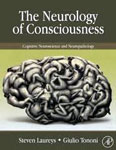 S. Laureys & G. Tononi (eds.)
S. Laureys & G. Tononi (eds.)
The Neurology of Consciousness: Cognitive Neuroscience and Neuropathology
(Academic Press 2008)
One way to study consciousness is to study its disorders, e.g., brain damage and disease states leading to vegetative states, coma, minimally conscious states, etc. This volume summarizes our current understanding of the functional and neuroanatomical underpinnings of consciousness by emphasizing a lesional approach offered via the study of neurological patients. See Amazon | Google Books
 Katalin Farkas
Katalin Farkas
The Subject’s Point of View
(Oxford 2008)
Descartes has had a major influence on the modern conception of the mind, one that is often felt to be negative. Farkas argues that discarding the Cartesian conception is not so easy since it is tied to our understanding of basic notions, including the criteria for being a person. The crucial Cartesian element for Farkas is not dualism, which is not adopted, but internalism. See Oxford | Amazon
 S. Knuuttila & P. Kärkkäinen (eds.)
S. Knuuttila & P. Kärkkäinen (eds.)
Theories of Perception in Medieval and Early Modern Philosophy
(Springer 2008 – Studies in the history of philosophy of mind, vol. 6)
Sense perception is one of the classical themes in philosophy. This collection of essays from leading historians of philosophy aims to shed light on the development of theories of sense perception in medieval Arabic and Latin philosophy, linking them with their ancient background as well as traditional and new themes in early modern thought. See Springer | Amazon | Google Books

Personal Identity
(Univ. California Press 2008, 2nd edition)
An updated version of this classic collection of essays on personal identity. The essays range from Locke’s classic memory account to recent defenses and criticisms of it. New to this edition are Shoemaker’s seminal essay ‘Persons and Their Pasts,’ selections from the Clark-Collins correspondence, and a new paper by Perry. Original edition 1975. See UC Press | Amazon | Google

Mental Causation: The Mind-Body Problem
(Columbia Univ. Press 2008)
Lucretius said that everything is atoms in the void. Contemporary physicalism agrees. How then can we—how can our thoughts, emotions, values—make anything happen in the physical world? This conceptual knot, the mental causation problem, is the core of the mind-body problem. In this book, Dardis shows us how to unravel the knot. See Columbia | Amazon | Google

Theory of Mind: How Children Understand Others’ Thoughts and Feelings
(Psychology Press 2008)
Most of us are continually aware that others have thoughts and feelings – but are children? When? This book is a concise and readable review of the extensive research into children’s understanding of what other people think and feel, a central topic in developmental psychology known as “Theory of Mind.” See Psychology Press | Amazon | Google

The Metaphysics of Memory
(Springer 2008)

Bernecker investigates central issues in the philosophy of memory and defends a version of the causal theory of memory. He also argues for direct realism about memory, proposes an externalist response to skepticism about memory knowledge, and develops a contextualist account of the factivity constraint on memory. See Springer | Amazon | Google

The Enigmatic Reality of Time: Aristotle, Plotinus, and Today
(Brill 2008)
This book integrates approaches from physics, philosophy, psychology, biology, phenomenology, and technology studies to explain a number of facets of the perennial question of time’s nature and existence. It also explores and explains two of the most influential investigations of time in classical Western thought: those of Aristotle and Plotinus. See Brill | Amazon | Google

Ontology of Consciousness: Percipient Action
(MIT 2008)
In this volume, scholars from various disciplines go beyond current neuroscience to explore insights offered by other approaches to consciousness. They consider such philosophical approaches to consciousness as Tibetan Tantric Buddhism, North American Indian insights, pre-Columbian Mesoamerican civilization, and the Byzantine Empire. See MIT | Amazon | Google

In Search of Time
(Macmillan 2008)
Time is the very foundation of conscious experience. Yet as familiar as it is, time is also deeply mysterious. Falk chronicles the story of how human beings have come to understand time over the millennia and, by drawing from the latest research in physics, psychology, and other fields, shows how that understanding continues to evolve. See Macmillan | Amazon | Google

The Philosophy of Time
(Routledge 2008)
This four-volume set is an authoritative reference that makes sense of the subject’s vast literature and continuing explosion in research output. Edited by L. Nathan Oaklander, a leading scholar in the philosophy of time, this work provides a synoptic view of the canonical scholarship and current debates at the cutting edge of the subject. See Routledge | Amazon | Google | See this flyer

The Phenomenal Self
(Oxford 2008)

Dainton presents a new account of the self, the key to which is phenomenal continuity. Provided our mental life continues, we can easily imagine surviving dramatic physical alterations. Dainton argues that such mental continuity is satisfactorily framed in terms of the sort of continuity we find in our streams of consciousness from moment to moment. See Oxford | Amazon | Google

A World for Us: The Case for Phenomenalistic Idealism
(Oxford 2008)

Foster argues that the world is ultimately constituted by facts about human sensory experience, or some richer complex of non-physical facts in which such experience centrally features. This sensory organization creates the physical world by disposing things to appear systematically world-wise at the human empirical viewpoint. See Oxford | Google | B. J. Garrett review

Feelings of Being: Phenomenology, Psychiatry and the Sense of Reality
(Oxford 2008)
A philosophical account of existential feelings in psychiatric illness and everyday life. Ratcliffe proposes that existential feelings have three distinctive characteristics: they are bodily feelings, constitute ways of relating to the world, and are responsible for our sense of reality. He also explains how a bodily feeling can be a sense of reality and belonging. See Oxford | Amazon | Google

The Kingdom of Infinite Space: A Portrait of Your Head
(Yale 2008)
Blending science, philosophy, and humor, Tallis examines the head, what happens in it, and how it is and is not connected to our sense of identity and consciousness. He aims, as he says, to turn readers into astonished tourists of the piece of the world closest to them, so they never again take for granted the head that looks at them from the mirror. See Yale | Amazon | Google

The Case for Qualia
(MIT 2008)

Many philosophers dismiss the notion of qualia, or sensory experiences that are internal to the brain. Qualiaphiles face the difficulty of establishing contact with the world when their access to it is seen by qualiaphobes to lie behind a “veil of sensation.” In this collection, proponents of qualia defend the indirect realist position and vigorously attack their opponents. See MIT | Google

The Mind-Body Problem: Knot or Not?
(Xlibris 2008)
Written over a period of fifteen years, this is the latest word on the identity theory: that mind and body are one. The reality of mind and body, their interaction, and the relation of knowledge of the mind to the brain are thoroughly explained. Turner provides a lucid examination of consciousness and shows how the divide between mind and brain can be bridged. See Xlibris | Google

The Reflexive Nature of Consciousness
(John Benjamins 2008)
Janzen argues that conscious states are necessarily reflexive: they have a built-in, “implicit” awareness of their own occurrence. He also explores the relation between reflexivity and phenomenal experience, offering the innovative thesis that phenomenal character is constituted by the implicit self-awareness built into every conscious state. See John Benjamins | Google

Supersizing the Mind
(Oxford 2008)

Clark argues that thinking doesn’t happen only in our heads but that “certain forms of human cognizing include inextricable tangles of feedback, feed-forward and feed-around loops: loops that promiscuously criss-cross the boundaries of brain, body and world.” A sustained argument in favor of a conception of mind that is extended rather than “brain-bound.” See Oxford | Google

A Natural History of Seeing
(W. W. Norton 2008)
We spend about one-tenth of our waking hours completely blind. Only one percent of what we see is in focus at any one time. There is no direct fossil evidence for the evolution of the eye. In graceful prose, Ings explores such mysteries, reaching back to ancient beliefs that vision arises from mysterious optic rays and forward to the day when robots can see. See W. W. Norton | Google | Amazon

A Dialogue on Consciousness
(Oxford 2008)
As an entirely physical phenomenon, consciousness seems to elude scientific explanation. But if consciousness is not physical, then how can it be explained? This book features two main characters, Tollens and Ponens—unemployed graduate students who secretly live in a university library—who bring the debate alive. See Oxford | Google | Amazon

Real Materialism and Other Essays
(Oxford 2008)
Written over two decades, these essays in the philosophy of mind and metaphysics cover five main areas: the mind-body problem; the self; free will and moral responsibility; thought, intentionality and their relation to consciousness; and the problem of causation with particular reference to the philosophy of David Hume. See Oxford | Google | Amazon | Andrew Melnyk review

Frontiers of Consciousness
(Oxford 2008)
This major volume from an all-star cast of scientists and philosophers stems from the Chichele lectures held at All Souls College in Oxford. Contributions range from the explanatory gap between science and consciousness, to investigation of consciousness in non-human animals, to the challenges that the mind-brain relation presents for clinical practice. See Oxford | Google | Amazon

Disjunctivism: Perception, Action, Knowledge
(Oxford 2008)
In recent years, disjunctivism has been the source of a lively and extended debate spanning the philosophy of perception, epistemology, and the philosophy of action. This volume presents seventeen specially-written essays which examine different forms of disjunctivism and explore the connections between them. See Oxford | Google | Amazon | Tim Crane review (pdf)

The Neurology of Consciousness: Cognitive Neuroscience and Neuropathology
(Academic Press 2008)
One way to study consciousness is to study its disorders, e.g., brain damage and disease states leading to vegetative states, coma, minimally conscious states, etc. This volume summarizes our current understanding of the functional and neuroanatomical underpinnings of consciousness by emphasizing a lesional approach offered via the study of neurological patients. See Amazon | Google Books

The Subject’s Point of View
(Oxford 2008)

Descartes has had a major influence on the modern conception of the mind, one that is often felt to be negative. Farkas argues that discarding the Cartesian conception is not so easy since it is tied to our understanding of basic notions, including the criteria for being a person. The crucial Cartesian element for Farkas is not dualism, which is not adopted, but internalism. See Oxford | Amazon

Theories of Perception in Medieval and Early Modern Philosophy
(Springer 2008 – Studies in the history of philosophy of mind, vol. 6)

Sense perception is one of the classical themes in philosophy. This collection of essays from leading historians of philosophy aims to shed light on the development of theories of sense perception in medieval Arabic and Latin philosophy, linking them with their ancient background as well as traditional and new themes in early modern thought. See Springer | Amazon | Google Books
Menu
 What’s a logical paradox?
What’s a logical paradox? Achilles & the tortoise
Achilles & the tortoise The surprise exam
The surprise exam Newcomb’s problem
Newcomb’s problem Newcomb’s problem (sassy version)
Newcomb’s problem (sassy version) Seeing and being
Seeing and being Logic test!
Logic test! Philosophers say the strangest things
Philosophers say the strangest things Favourite puzzles
Favourite puzzles Books on consciousness
Books on consciousness Philosophy videos
Philosophy videos Phinteresting
Phinteresting Philosopher biographies
Philosopher biographies Philosopher birthdays
Philosopher birthdays Draft
Draftbarang 2009-2024  wayback machine
wayback machine
 wayback machine
wayback machine